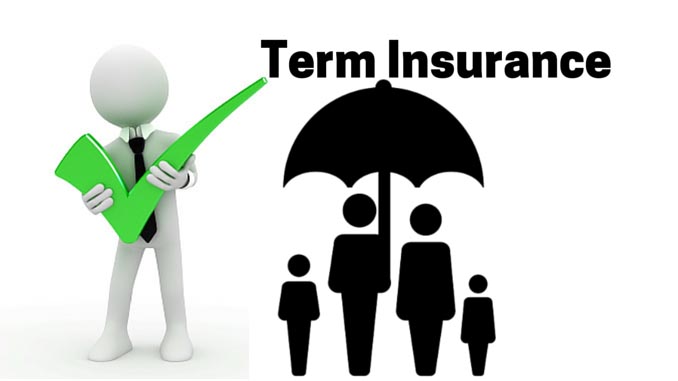
Term life insurance is the purest form of life insurance It provides insurance protection for a specific period of time, such as 10, 15, 20 or 30 years. If the insured person dies within the time the policy is in force, the nominees/beneficiaries receive the Sum assured amount of the policy tax-free. If you outlive your policy term, the insurance terminates and you must buy another policy if you still want to carry life insurance. You can also buy term life insurance that covers you until you reach a certain age, usually 65 or 70.
Since it is a "pure life insurance protection," term life insurance is also the cheapest form of life insurance. Because of its low cost among life insurance types, term life continues to be the product of choice by most of the people seeking protection.
Generally, any one purchases life insurance to replace him for household income in case of death, so that loved ones can pay debts and living costs, without compromising on the standard of living. For example, if an family buys a home with some loan, and one of the spouse were to die tomorrow, the other spouse would have to pay the mortgage on his or her own. If they had a term life insurance policy, the surviving spouse could receive enough tax free money from the policy's death benefit to pay off the mortgage.
Term insurance doesn't just cover specific debts, however. If case of children’s education, term insurance is low cost life insurance that can provide money for college and living expenses if the life assured were to die before your children are fully grown.
Pros:
cons:
When you apply for term life coverage, the insurance company will probably require a medical exam before issuing a policy. The examination covers your height, weight, blood pressure, medical history and blood and urine testing. With the blood and urine tests, the insurer looks for specific medical problems and the presence of nicotine. Positive results could affect your premium, or even your ability to buy a policy.
Smokers will usually pay more for term life insurances.
Different flavours of term life
As you age, the likelihood you will die increases. That's why life insurance costs more as you get older. You can lock in low premiums by buying for a "level premium" policy. That means for a specific time period, say 20 years, your premium rate stays the same. Many term policies give you the option to renew your coverage at the end of the term without undergoing another medical exam, although your premiums will rise for annually after the level term period — often substantially. A less popular policy is "annual renewable term." This gives coverage for one year with the option of renewing it each year for a specified duration, such as 20 years. With this policy,the rates go up every year you renew and are calculated based on the probability of life assured’s dying within the next year.
If someone would like to have term life insurance in place to provide for beneficiaries yet he/she is confident that he will outlive the policy period , then he could consider "return of premium" term life insurance. Under this type of policy, if no death benefit has been paid by the end of your insurance term, they will receive all your premiums back. It pays to shop around for a policy like this, but on the low end you can expect to pay 50 percent more in premiums than comparable traditional term life insurance.
Figuring out which term you should buy — 10 years, 20 years, 30 years or some other number — requires a major review of your debts, financial needs, dependent's needs — and when all those might change. Typically one should take the maximum possible term, when buying a term insurance, as the probability of getting the claim is highest, the premiums remain constant for the said period and at an older age, due occurrence of life-style deases such as blood pressure or diabetes, the premiums could rise substantially or one may not be insurable too. It's a good idea to review your life insurance needs carefully & regularly, both when you buy the policy and when there's major a life change." One may not have the adequate coverage needed or may have more than you needed” either ways is not efficient.
In short, the objectives for buying term insurance are as under :
The cash value debate A whole life insurance policy covers you for your whole life, no matter when you die. It also includes a "bonuses” a that build up value over time as it accrues interest or investment gains. Variable universal life insurance (VUL), a form of permanent life insurance, is popular because it offers a cash value account that may build up with interest based on the performance of the stocks, bonds or other investments.
Some financial planners advocate VUL policies because they force you to save money in the cash value component. Others recommend you buy term insurance for the cheaper premium and then invest the difference in mutual funds or other investments. VUL also allows you to change your death benefit and subsequent premium payments over time.
Cash value in life insurance should not be considered a traditional investment because any partial withdrawals or loans will reduce your death benefit. In addition, every year you own the policy, more of your premium goes to pay for the cost of insuring you and less goes toward the cash value.
FOR DETAILS :
CALL 18001032944
KD Financial Services having registered office in New Delhi is an integrated firm that specializes in offering a varied bouquet of customized financial services to Institutions. The firm today offers complete financial solutions including areas like corporate Finance, Equities, Mutual Funds, Wealth Management etc
Read MoreKD Financial Services
255 First Floor Okhla Phase -3,
NR ICICI Bank,
New Delhi - 110033.
Toll Free No.: 18001032944
Email:info@kdfinancialservices.in